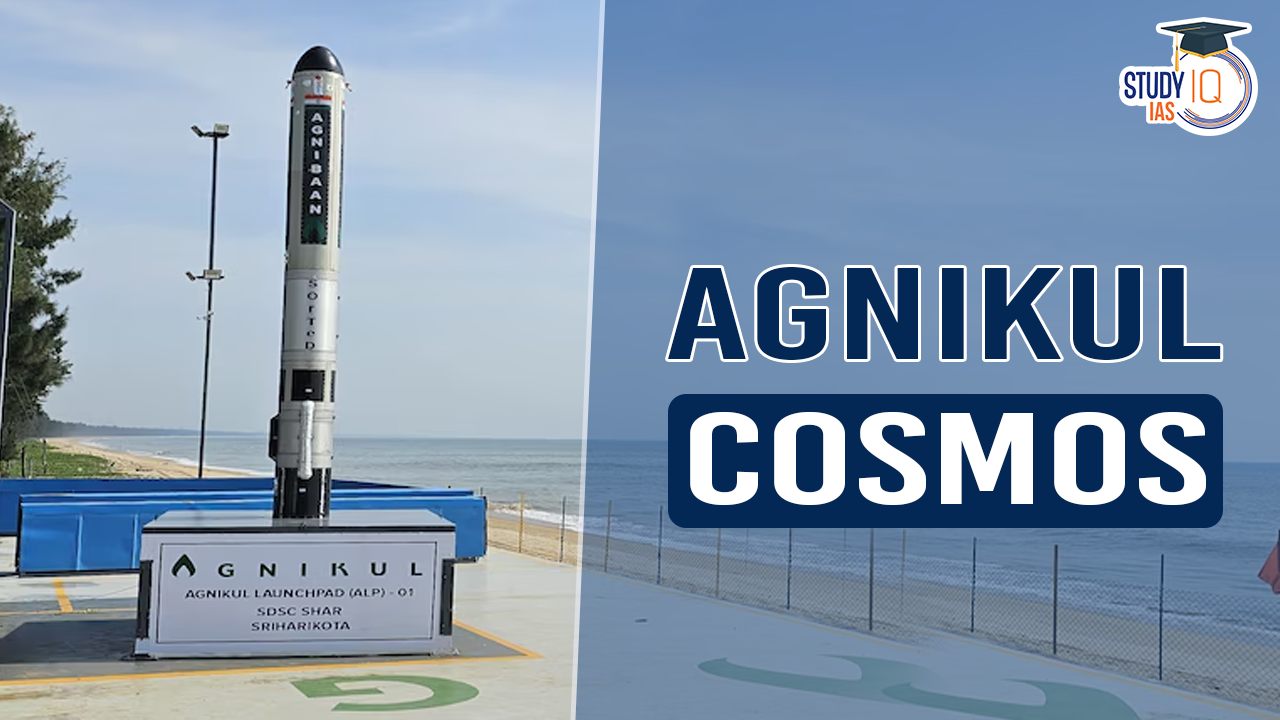In a groundbreaking achievement for the Indian space industry, startup Agnikul Cosmos has successfully launched its first sub-orbital test vehicle, Agnibaan SOrTeD (Sub-Orbital Technology Demonstrator), powered by the world’s first single-piece 3D-printed rocket engine. This historic event took place on May 30, 2024, at 7.15 am from Agnikul’s private launchpad at Sriharikota, marking several significant firsts for both the company and India’s burgeoning private space sector.
| Fact |
| This Agnibaan Rocket launch follows Skyroot Aerospace’s successful Vikram rocket launch in November 2022, which also received widespread recognition. Both companies are poised to offer commercial satellite launch services within a year. |
Agnikul Cosmos Successfully Launched Agnibaan Rocket
Agnikul Cosmos, an Indian space startup, achieved a milestone by successfully launching Agnibaan SOrTeD, a sub-orbital vehicle powered by the world’s first single-piece 3D-printed rocket engine. Conducted from their private launchpad at Sriharikota, this marks India’s first semi-cryogenic engine flight. The innovative engine, Agnilet, utilizes sub-cooled oxygen, reducing launch costs and assembly time. Agnikul aims to provide affordable launch services, planning their first orbital mission by year-end. Agnibaan rocket, marking a new chapter in India’s space industry.
| Company |
Achievement |
Launch Details |
Engine Technology |
Future Plans |
| Agnikul Cosmos |
Successful sub-orbital launch of Agnibaan SOrTeD, world’s first single-piece 3D-printed engine |
Launched from private pad at Sriharikota, India’s first semi-cryogenic engine flight |
Agnilet engine, single-piece 3D-printed, uses sub-cooled oxygen |
First orbital mission by year-end, affordable launch services |
Agnikul Cosmos Launch Details
Agnibaan SOrTeD Mission
- Suborbital flight intended to reach a height of approximately 8 kilometers.
- Designed to splash down in the sea post-flight.
- Capable of carrying payloads ranging from 30 kg to 300 kg.
Features of Agnikul Cosmos
- Innovative Technology:
- Agnikul Cosmos is renowned for its pioneering use of innovative technologies in the aerospace sector, particularly its development of the world’s first single-piece 3D-printed rocket engine, Agnilet.
- 3D Printing in Rocket Manufacturing:
- The company utilizes advanced 3D printing techniques to manufacture rocket components, enabling streamlined production processes, reduced assembly time, and enhanced integration, ultimately leading to cost-effective launch solutions.
- Semi-Cryogenic Engine:
- Agnikul Cosmos has introduced the Agnilet engine, which utilizes sub-cooled oxygen as fuel, marking a departure from traditional cryogenic engines. This innovation offers improved efficiency and cost-effectiveness in rocket propulsion.
- Launchpad Infrastructure:
- Agnikul operates its own private launchpad at Sriharikota, India’s only operational spaceport. This infrastructure provides the company with autonomy and flexibility in conducting launches, contributing to its mission versatility.
- Mobile Launch Capability:
- The company’s mobile launchpad, Dhanush, enables launches from various locations, offering enhanced logistical flexibility and the ability to cater to diverse mission requirements.
- Payload Versatility:
- Agnikul’s launch vehicles, such as Agnibaan SOrTeD, are designed to accommodate payloads ranging from 30 kg to 300 kg. This versatility allows the company to serve a wide range of satellite deployment needs.
- Future-Oriented Vision:
- Agnikul Cosmos is committed to advancing India’s space industry by providing affordable and efficient launch services. The company’s ambitious plans for future missions, including its first orbital launch, demonstrate its forward-looking approach to space exploration.
- Recognition and Support:
- The company has garnered recognition and support from prominent entities such as the Indian Space Research Organisation (ISRO) and IN-SPACe, reflecting its significance and contributions to India’s space sector.
- Industry Collaboration:
- Agnikul Cosmos collaborates with leading academic institutions and research centers, including IIT Madras, leveraging expertise and resources to drive innovation and technological advancement in the aerospace field.
- Commitment to Excellence:
- With a dedicated team of professionals and a commitment to excellence, Agnikul Cosmos aims to push the boundaries of space technology, contributing to India’s emergence as a key player in the global space industry.
Agnikul Cosmos Significance
- Agnikul Cosmos pioneers the world’s first single-piece 3D-printed rocket engine, Agnilet, revolutionizing rocket propulsion.
- It offers cost-effective launch solutions for small satellites, reducing barriers to entry for space exploration.
- The establishment of a private launchpad at Sriharikota enhances India’s autonomy in space endeavors.
- Agnikul Cosmos drives growth and innovation in India’s commercial space sector, fostering economic development.
- It facilitates partnerships between private sector, government, and academia to accelerate space technology development.
- The company elevates India’s reputation as a hub for space innovation, attracting international attention and investments.
- Agnikul Cosmos inspires aspiring engineers and scientists to pursue careers in space exploration and technology.
- It enables future missions, including lunar and interplanetary exploration, by providing reliable launch services.
- The focus on efficient propulsion technologies contributes to reducing the carbon footprint associated with space launches.
- Agnikul Cosmos bolsters India’s space capabilities for national security, communication, and scientific research purposes.
Future Plans of Agnikul Cosmos
| Future Plans of Agnikul Cosmos |
Description |
| Orbital Launches |
Agnikul Cosmos plans to conduct its first orbital launch by the end of the current financial year. These missions aim to deploy satellites into Earth’s orbit, showcasing the company’s capabilities in accessing space beyond sub-orbital flights. |
| Regular Launch Services |
The company aims to offer regular launch services for small satellites in the next calendar year. By providing frequent and reliable launch opportunities, Agnikul intends to meet the growing demand for satellite deployment and contribute to the space industry’s expansion. |
| Technology Advancements |
Agnikul Cosmos continues to focus on advancing its rocket technology, including further developments in 3D-printed engine components and propulsion systems. These advancements aim to enhance the performance, reliability, and efficiency of its launch vehicles, ensuring competitiveness in the evolving space market. |
| Global Expansion |
With successful launches and technological advancements, Agnikul Cosmos seeks to expand its presence globally. The company aims to establish partnerships and collaborations with international entities to leverage expertise, resources, and market opportunities, driving growth and innovation in the global space sector. |
| Environmental Sustainability |
Agnikul Cosmos remains committed to environmental sustainability in space exploration. Future plans include the development of eco-friendly propulsion technologies and initiatives to minimize the ecological footprint of space missions, aligning with global efforts to promote sustainable space exploration. |
| Research and Development |
The company continues to invest in research and development initiatives to push the boundaries of space technology. Future projects may involve the exploration of advanced propulsion concepts, novel materials, and innovative spacecraft designs, positioning Agnikul Cosmos at the forefront of space innovation and exploration. |
Sharing is caring!


 Comprehensive Remote Sensing Observation...
Comprehensive Remote Sensing Observation...
 Serious Fraud Investigation Office (SFIO...
Serious Fraud Investigation Office (SFIO...
 Article 142 of Indian Constitution, Sign...
Article 142 of Indian Constitution, Sign...





















